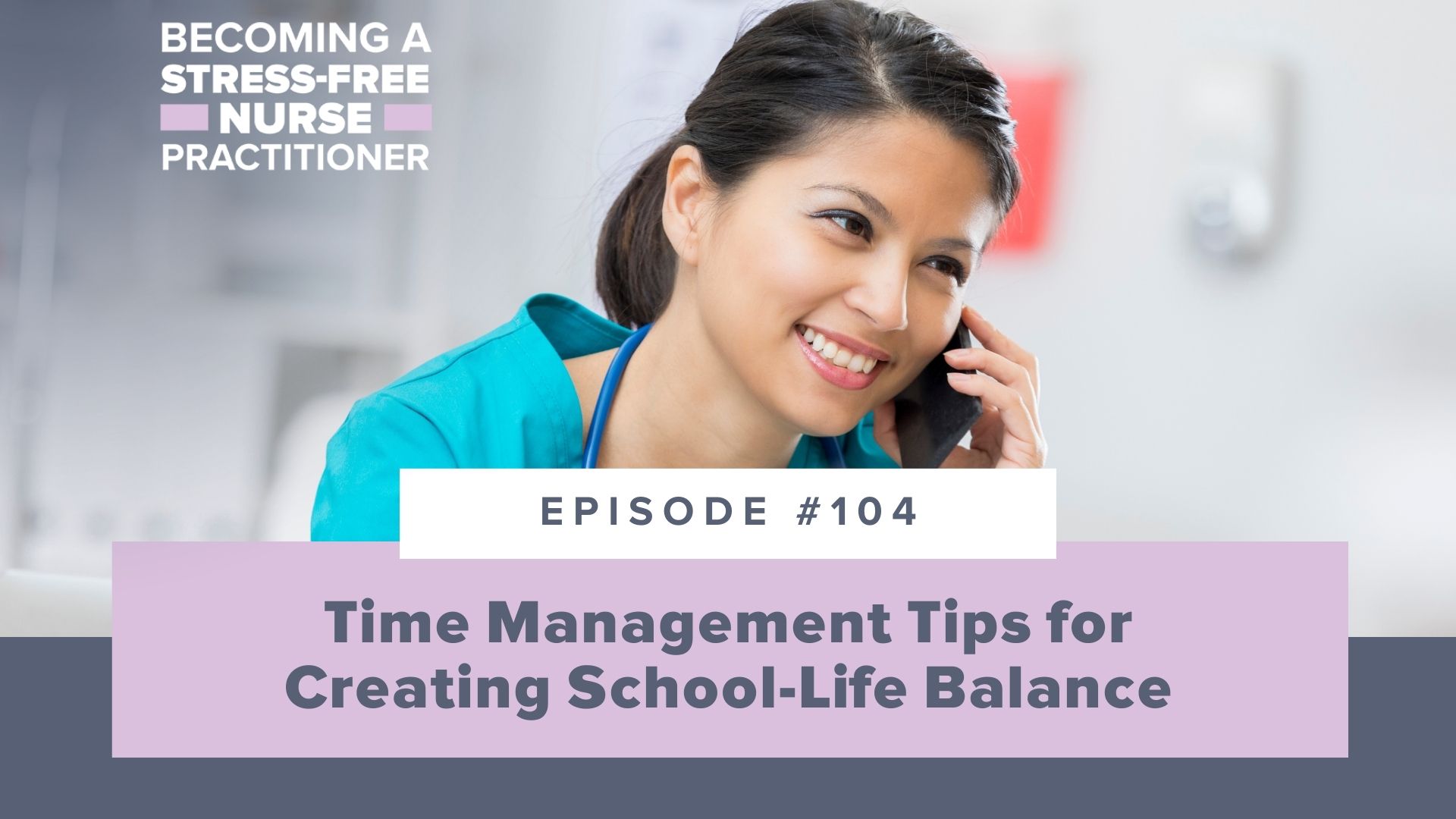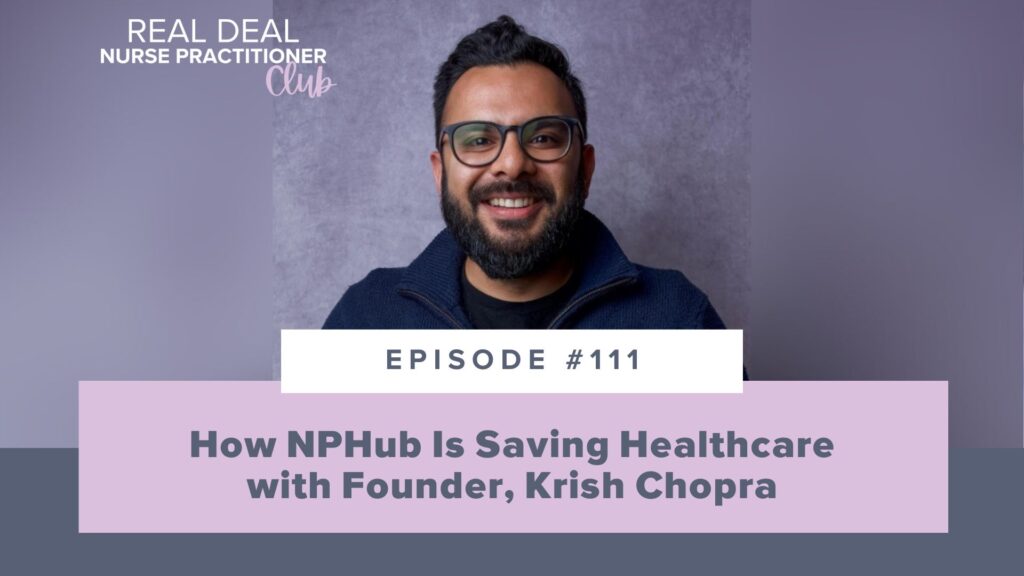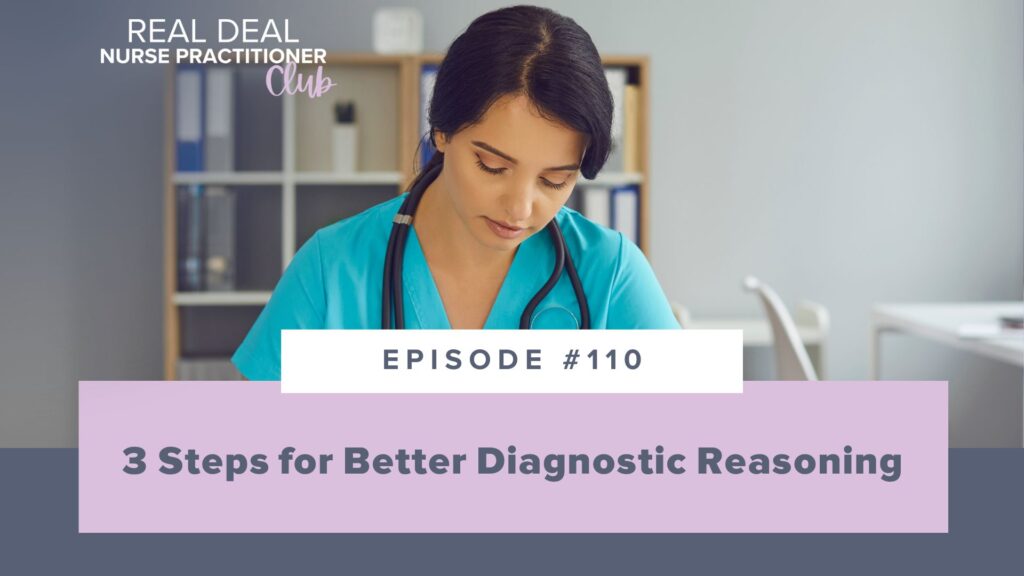Ep #104: Time Management Tips for Creating School-Life Balance
- by
- Jan 10, 2024
- Podcasts

What You Will Discover:
- Anna’s top tips for balancing both life and school.
- How to minimize stress on your brain.
- The power of delegating what you can outside of school work.
- How to work smarter, not harder.
- Why prioritizing self-care is not selfish.
Featured on the Show
- Follow me on: Facebook | Instagram | YouTube | TikTok
- Ep #99: Mental Health as a New NP
Full Episode Transcript:

Welcome to Becoming a Stress-Free Nurse Practitioner, a show for new NPs and students that want to pass their board exam the first time and make that transition from RN to NP as seamless as possible. I’m your host Sarah Michelle. Now, let’s dive into today’s episode.
Anna: Welcome back everyone. It is Anna here and today I am doing this episode solo. As we enter into the new year I think it’s really important to talk about how to find a balance between life and school.
Becoming a nurse practitioner is an amazing journey and it is well worth it, but I completely understand how hard it is. We all have different priorities and different schedules and it can be difficult to find the time to study and do well in school while also finding the time to do things you enjoy.
We absolutely need to find ways to improve our time management and lower our stress. Easier said than done, I know. But let’s talk about a few tangible tips that helped me. The first thing you need to do is identify your priorities outside of school.
What is important to you? Is it spending time with your partner or spouse, your children, other family members and friends? Are you currently involved in activities that you want to keep participating in? Maybe you’re a part of sports or a book club or you just meet your friends for breakfast every Saturday morning.
Everyone’s priorities are different, so take some time to reflect on your non-negotiable, must continue to make time for things. Pick four or five of them as your top priorities in addition to school. And now there may be days or weeks where each priority is higher or lower or maybe not met, and that is okay.
But next, when we get to our time management, we’ll talk about how to best manage our time to make sure we’re spending our energy where we need to and where we want to. Once you have your priorities list, you can start to think about eliminating unnecessary commitments.
Remember, no is a full sentence. If you don’t have time for something and it does not bring you joy or bring you closer to your goal of becoming a real deal nurse practitioner, you don’t have to apologize for not participating in it.
When it comes to being an NP student, you need to plan ahead. I personally love an old fashioned paper planner. I just get so much satisfaction from physically crossing things off of the to-do list. And of course, I love to use different colored highlighters for different tasks.
For example, my work commitments were in blue highlighter, my school meetings were in orange and any other family commitments were in yellow. I’m a very visual person, so that is just what helped me.
I know some people are fans of calendar functions on phones, and if that is you, there are a ton of different apps you can download. The possibilities are truly endless on different types of digital planners and calendars.
Then, the first thing I would do whenever I got a new syllabus or a topic outline for a course was to write down all of the different due dates. So when are the tests? When are the assignments due? Are there any special class meeting times? I planned out all of the important dates in the very beginning to get a good sense of what the next few months would look like.
Really, after that I lived one to two weeks at a time. It can be overwhelming to keep focusing on everything coming up and all the things you still need to do. So I found it much more manageable just to focus on one or two weeks at a time. For example, I know I’ve got a test next week, so I will make that a priority for school. Or maybe I have a paper that’s due for my theory class, I should probably start working on it.
And then, I also found it helpful to break tasks down into much more manageable pieces. So, for discussion boards, one day I would write down in my planner to do the assigned reading, and then I’d put the material away. Then another day, I would outline what I wanted to write, and then I would put it away. And then the next day, I would write my post.
By that time, my brain had time to digest the material, my thoughts were organized, and writing from the outline was so much easier. It is scientifically proven that we don’t retain information as well when we study for long blocks of time. It is better to do a bunch of small study sessions throughout the week.
Or, if you only have one really solid day where you can study, make sure to give yourself lots of breaks. Go for a quick walk, have a snack or a meal, watch a 30-minute show, but don’t go down the rabbit hole of binge watching a whole series. Those short brain breaks are super important to your retention of the material you’re studying, but also, once again, they are just so much less stressful to your brain.
And along the same lines of minimizing the stress on our brains, let’s talk about how to work smarter, not harder. There are lots of resources out there to help you make the most of your time and energy. The first thing I’m going to mention might sound a little old-school, but definitely check out your school’s library.
Whether you are in a brick-and-mortar school or an online program, you will have access to a library database system which is managed by librarians. Whenever I needed help with research for a paper or my capstone project, the librarian was an excellent resource.
You can also look into other services to help you with your coursework. I highly recommend some type of proofreading software above and beyond spellcheck. And if you are in a doctoral program like a DNP with lots of writing and research, there are apps that you can use to help you with citation creation and manage your references.
Outside of writing for school, I would be remiss not to mention the SMNP Q bank. You can complete practice questions on your phone or laptop whenever you want to supplement your studying. It features a collection of approximately 1,500 questions that you can access anytime, anywhere. So definitely use that to your advantage and check out our Q bank subscription.
The only other thing I want to add here is to look at things outside of school that you can streamline or delegate to others. I personally am a big fan of curbside grocery pickup or even better, home delivery. That definitely saves me time and money.
But seriously, it is okay to ask for help. Think about things you spend time on, cooking meals, picking up kids, cleaning the house, other errands, and what you can ask people to help with or how you can be more efficient with them.
Along the same lines of reaching out to people, you need to know who is in your support group. Your immediate support group is going to be your peers. I have been in both in-person and online programs, and no matter where I was going to school, my peers became close friends.
They truly understand what you are going through because they’re in the thick of it too. I highly recommend connecting with them, making a group chat, or meeting up with them in person. There is research that shows that having a supportive network can give you resilience and help to relieve stress.
And lastly, let’s talk about how to make sure you put yourself first at least some of the time. I love the phrase, self-care is not selfish. For whatever reason, we are made to feel bad about doing things for ourselves, but the bottom line is that we cannot truly care for others and succeed in the different areas of our lives if our own needs and happiness are not being met.
We actually did another podcast episode on this several weeks ago. It was the episode on self-care and taking care of your mental health. The big takeaways were making sure you are setting aside time for the things you enjoy and that provide you with something relaxing. That could be exercise, crafting, making time to binge watch your favorite show.
And part of making sure that I have the time to do those things I enjoy, the things that recharge me and give me the energy that I need for other areas of my life, mean that there are things I need to say no to. Remember, no is a complete sentence. It is okay to say no to things that you just don’t have the time for or they just don’t serve you or help you grow.
We talked a lot about different tips to help you strike a better balance between NP school and life. Remember to identify your priorities, both in school and out of school, plan ahead, and work smarter, not harder.
Then create a support group and don’t forget to take care of yourself too. I really hope this episode gave you a few tangible tips that you can use to better manage your time and your energy.
Thank you, everyone, for tuning in and I hope you enjoyed this topic. Over the next few weeks, we will have some more great topics like global health, advanced care planning, and diagnostic reasoning skills. So be sure to follow our podcast and follow along on our social channels. Until next time.
As an extra bonus, friends, if you’re looking for support no matter what phase of your nurse practitioner journey you’re currently in, I have communities available for both students and new nurse practitioners. In these communities, we work to uplift one another and grow this profession together every single day. Links to join will be included for you in the show notes.
Thanks for listening to Becoming a Stress-Free Nurse Practitioner. If you want more information about the different types of support we offer to students and new NPs, visit npreviews.com/resources. See you next week.
Enjoy the Show?
- Don’t miss an episode: follow the podcast on Spotify, Apple Podcasts, Google Podcasts, or RSS.
Search the Blog
Join our Facebook Group!
Get FREE support and encouragement from thousands of NP students and our NP Support team.
Learn More3 Study Hacks to Conquer Your NP Exam!
Download these tips that have helped thousands of students pass their NP board exams.
Download NowInstitutional Partnerships
Are you a faculty member and would like to bring Sarah Michelle’s resources to your school? Email us at nursinggroups@blueprintprep.com for special institutional pricing or click on the link below to learn more.
Learn MoreGroup Discounts
Are you a student and have 10 or more classmates interested in purchasing Sarah Michelle’s courses? Email us at nursinggroups@blueprintprep.com for special pricing.



